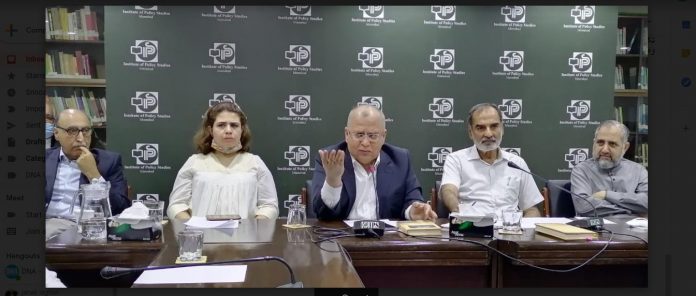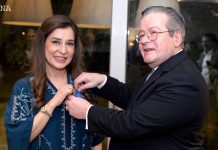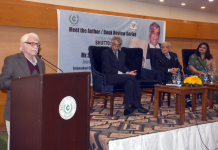DNA
ISLAMABAD, OCT 10 – Ambassador (retd) Salman Bashir, Pakistan’s former Foreign Secretary has warned that the international and regional spoilers conspiring against Afghan peace process would themselves be the biggest losers in the end game.
He was addressing the launch of Pakistan’s former ambassador to Afghanistan, Ambassador (retd) Syed Abrar Hussain’s book Afghanistan: Mulla Umer se Ashraf Ghani Tak recently published by IPS Press – the publishing arm of Institute of Policy Studies, Islamabad – which also included a roundtable discussion on the recent developments on Afghanistan after 19 years of US invasion.
Ambassador (r) Syed Abrar Hussain has served as a Pakistani representative in Afghanistan on more than one occasions, whereas his services in the Foreign Ministry also had a lot to do with the country’s affairs. The writer witnessed history being made during all this time, while having an opportunity to observe various landmark events very closely.
Personal accounts of historic events from Mulla Umar’s era and during Ashraf Ghani’s time, a rich commentary on the history of Pak-Afghan relations and also insights into the Afghan peace process are key features of the fascinating memoirs. The author has also presented an admissible strategy at the end of the publication for the amelioration of Pak-Afghan relations, which should be looked at by the policy circles of both sides with sincerity and honesty. The given recommendations not only have the potential to improve bilateral relations between Pakistan and Afghanistan, but can also pave way for achieving sustainable, long-lasting peace in the region.
Chaired and hosted by Khalid Rahman, executive president, IPS, the session was addressed, among others, by Ambassador (r) Abdul Basit, Ambassador (r) Ayaz Wazir, Brig (r) Said Nazir Mohmand, Air Cdr (r) Khalid Iqbal, Ammara Durrani, senior research fellow, Jinnah Institute, Afghan scholars Professor Haroon Khatibi and Naseer Ahmed Naveedi from Center for Strategic and Regional Studies (CSRS), Kabul, Dr Adnan Sarwar Khan, former dean, Peshawar University, and senior journalists Faizullah Khan (ARY) and Naimat Khan (Arab News).
Ammara Durrani was of the view that international media and academia does not give much space to Pakistani perspective in geopolitics and there are hardly any Pakistani commentators visible. Pakistan must make use of its diplomats and train them to help set Pakistani narrative through mainstream and social media at the global stage.
Commending the book she said that such efforts need to be amplified so that the generations of today in Afghanistan and Pakistan should know the pre-9/11 history of both the nations.
Ambassaor (r) Basit stated that Taliban claim themselves as “Islamic Emirate” and as an ideological movement their strength did not lie in democracy as any such move would only break their organization and end their clout. They may never become part of any democratic government in a republican Afghanistan. He feared that there may not be any intra-Afghan reconciliation in the end and the development may only prove to be an effort to buy or consume some time. Pakistan on the other hand should stay prepared for any such scenarios, and instead of taking credit for the peace process and taking the burden of more responsibilities in the process, should try to carve out a backup strategy as well, bringing all stakeholders on one page, developing a consistent policy and they propagating effectively through a well-formed narrative.
The speakers in general were unanimous that as much as it was essential for Pakistani narrative to reach out to the world outside. It was rued that there are many books available by Indian authors and researchers on the topic of Afghanistan, but any presentable work by a Pakistani author on the subject was hard to find.
The experts underscored the need for utilizing the wealth of knowledge Pakistan’s foreign policy practitioners possessed, suggesting that the training of Pakistan’s former high commissioners and ambassadors on efficient use of conventional and social media for indigenous knowledge production could be a useful tool to further the country’s foreign policy objectives. Abrar Hussain’s publication, they viewed, could be seen as a valuable resource in this regard.
It was also stressed that alongside taking on-ground steps, Pakistan should also focus on effectively propagating its narrative internationally by apprising the world what the country has done for Afghanistan and regional peace so far and where it will be headed to in the future.

















